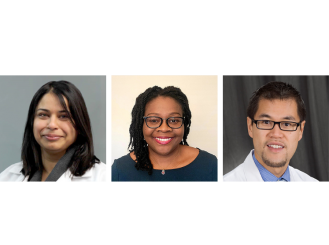May 06, 2022
By Shail Maingi, MD, Lola Fashoyin-Aje, MD, and Chunkit Fung, MD, MSCE
The average life expectancy of LGBTQ Americans is years shorter than that of Americans who do not identify as LGBTQ. One cause of this gap is increased cancer risks and worse outcomes when treated. Acknowledging this reality, in 2016, the U.S. National Institutes of Health (NIH) designated “sexual and gender minorities” (SGM) as a health disparities group. In effect, this recognized the negative impact of minority stress and structural discrimination on the overall well-being of LGBTQ people and created research and funding opportunities.1 Even before this official designation, what was known at the time as the ASCO Health Disparities Committee (now the ASCO Health Equity and Outcomes Committee) was focusing on SGM communities and their cancer-related disparities, which negatively impact at least 127,000 newly diagnosed people with cancer a year in the United States alone.
According to Jennifer Griggs, MD, MPH, who spearheaded these efforts within ASCO, “Out of an urgent need to acknowledge and address the needs of SGM people facing cancer, a small writing group of volunteers and ASCO staff created [a] 2017 position paper.” The position paper, “Strategies for Reducing Cancer Health Disparities Among Sexual and Gender Minority Populations,” acknowledges the unique barriers to equitable and high-quality care that SGM people risk experiencing across the cancer continuum and offers strategies to mitigate these disparities.2 The paper also represents a commitment from ASCO to include SGM people in their work going forward, in part to address the historic exclusion of these populations from patient outreach, support navigation, education, workforce development, quality improvement, research, and advocacy efforts. Still, according to Dr. Griggs, “This was only a first step and did not sufficiently address the unique experiences and barriers to care of transgender people or of intersex people... clearly, additional steps are needed to transform care for minoritized people, including people who are members of one or more marginalized group.”
Historically, stigma, violence, social isolation, and job and housing loss have been the consequences of disclosing an LGBTQ identity. Understandably, because of this stigmatized and vulnerable existence, many LGBTQ people feel the need to protect themselves by not disclosing their sexual orientation and gender identity (SOGI). Invisibility of these communities continues today due to ongoing fear of discrimination and institutional structures that follow an outdated and harmful “don’t ask, don’t tell” model that perpetuates stigma. This erasure in and of itself is harmful to LGBTQ people and their loved ones.
While overt discrimination toward LGBTQ people remains very real, the world is changing, with more people in the United States disclosing their SGM identity. For example, 15% of younger adults in the 2020 U.S. census and 7.1% of all adults in a 2021 Gallup poll identified as LGBTQ. And conversations around health equity have become front and center following ongoing racial justice protests, rejection of surges in violence toward BIPOC (Black, Indigenous, People of Color), and awareness of legislation negatively impacting health care access for transgender individuals and women. This, in turn, has created more opportunities for ASCO to address the structural barriers to quality cancer care that LGBTQ individuals and their families experience. ASCO is leading the way in this effort nationally as a health care organization.
Most, but not all, of the work being done within ASCO to advance equitable care for SGM populations is accomplished by the experts on ASCO’s SGM Task Force, which was formed in 2018 to help actualize the recommendations in ASCO’s 2017 SGM position paper. Some of these efforts have included the creation of an SGM-focused blog series on Cancer.Net, ASCO’s patient information website, conducting research investigating institutional and provider-level barriers to SOGI data collection, meeting with governmental agencies including the Center for Healthcare Statistics in order to advocate for SOGI data collection, developing an updated ASCO Education course on cultural literacy that includes SGM populations for the first time, and working with the European Society for Medical Oncology (ESMO) to include a section on cancer in LGBTQ populations in the latest version of the ASCO-ESMO Global Curriculum. ASCO also has provided comments to organizations such as the NIH’s SGM Research Office on the need for an oncology focus in that program’s 5-year strategic plan.
Central to the efforts of the SGM Task Force have been several projects aimed at bolstering successful SOGI data collection with patient education, provider education, research, and policy initiatives. In the year to come, as federal stakeholders begin to weigh in on best practices for SOGI data collection, this group of experts will continue to focus on advancing SOGI data collection in both research and clinical settings across the cancer continuum. Advocacy for inclusion of SGM individuals in clinical trials, fair payment models, and best practices for end-of-life care is also ongoing. This year, the SGM Task Force also will be revisiting some of the projects that were sidelined by the pandemic, including opportunities for networking, patient and provider education, and mentoring aimed at workforce development and generating inclusive research methods. Through these efforts, ASCO ultimately hopes to understand more about the lived experiences of the SGM oncology workforce and of LGBTQ people with cancer through research and inclusion of SOGI variables in quality metrics. And, as we better understand the barriers to equitable treatment, ASCO can begin to dismantle outdated structures and build more inclusive ones for LGBTQ people and their families.
In a world in which human rights protections and personal safety for LGBTQ people are highly variable by country, ASCO has chosen to commit to equity for every patient, every day, everywhere.
ASCO’s recently issued Diversity, Equity, and Inclusion Action Plan will ensure that the Society delivers on its commitment to equity and extends that promise to SGM individuals. Patients, their families, and oncology workforce members experience isolation, harassment, microaggressions, and systematic discrimination based on their SGM identity. For racial minorities, in particular, the cost and burdens of an SGM identity can be high and be associated with worse cancer outcomes. ASCO recognizes that we are called upon to do more, and we will.
As we approach this year’s ASCO Annual Meeting with its ongoing focus on equity, innovation, and technology, it is important to recognize that the inclusion of SOGI variables in any artificial intelligence, database, or new technology is particularly important. Proactively adopting approaches that allow for safe disclosure of minoritized identities and give the opportunity for every patient to be counted is crucial. Otherwise, we risk advancing quality care only for some. Leaving behind these historically disenfranchised populations codifies and perpetuates harmful invisibility, an invisibility that was once thought to be protective of LGBTQ populations but that we now know costs SGM people years of life.
Dr. Maingi is the Dana-Farber Cancer Network Health Equity & Inclusion liaison at the Dana-Farber Cancer Institute at South Shore. Dr. Maingi is co-chair of the ASCO SGM Task Force and a member of the Diversity and Inclusivity Task Force, Symptoms and Survivorship Task Force, and Practice Health Task Force. Follow Dr. Maingi on Twitter at @shail_maingi.
Dr. Fashoyin-Aje is the associate director of Science & Policy to Address Disparities in the Oncology Center of Excellence at the U.S. Food and Drug Administration. She is a member of the ASCO SGM Task Force and the ASCO-ACCC Collaboration to Increase Participation of Racial & Ethnic Minority Populations in Cancer. Follow her on Twitter @LolaFashoyinAje.
Dr. Fung is the associate chief of the Solid Tumor Oncology Program at the James P. Wilmot Cancer Institute, University of Rochester Medical Center. He is a member of the ASCO SGM Task Force and the Health Equity and Outcomes Committee.
References
- Boehmer U, Jesdale BM, Streed CG Jr, et al. Intersectionality and cancer survivorship: Sexual orientation and racial/ethnic differences in physical and mental health outcomes among female and male cancer survivors. Cancer. 2022;128:284-91.
- Griggs J, Maingi S, Blinder V, et al. American Society of Clinical Oncology Position Statement: Strategies for Reducing Cancer Health Disparities Among Sexual and Gender Minority Populations. J Clin Oncol. 2017;35:2203-8.3.


